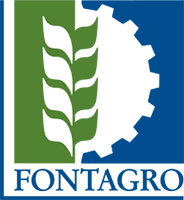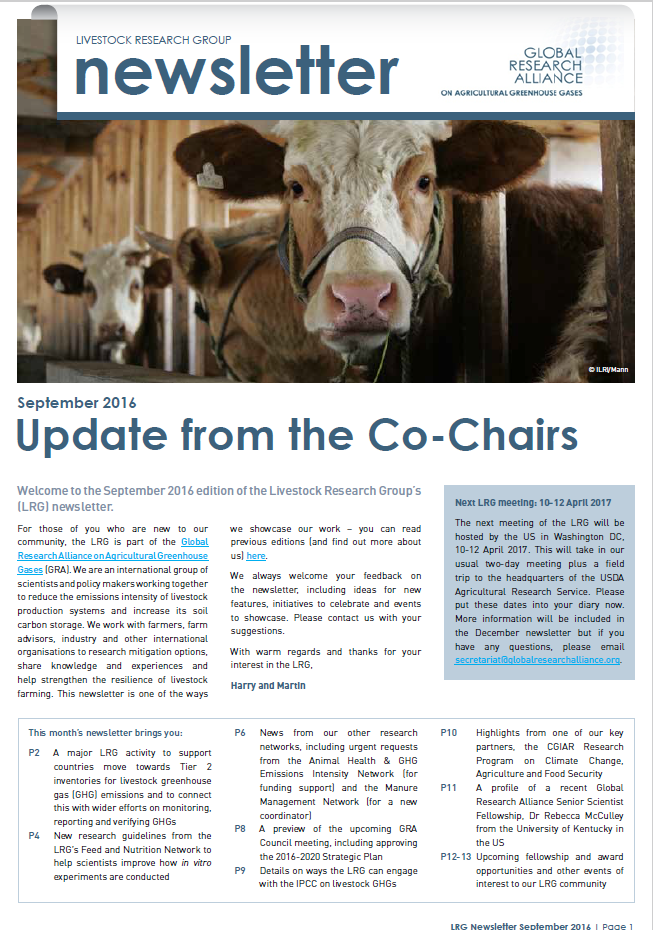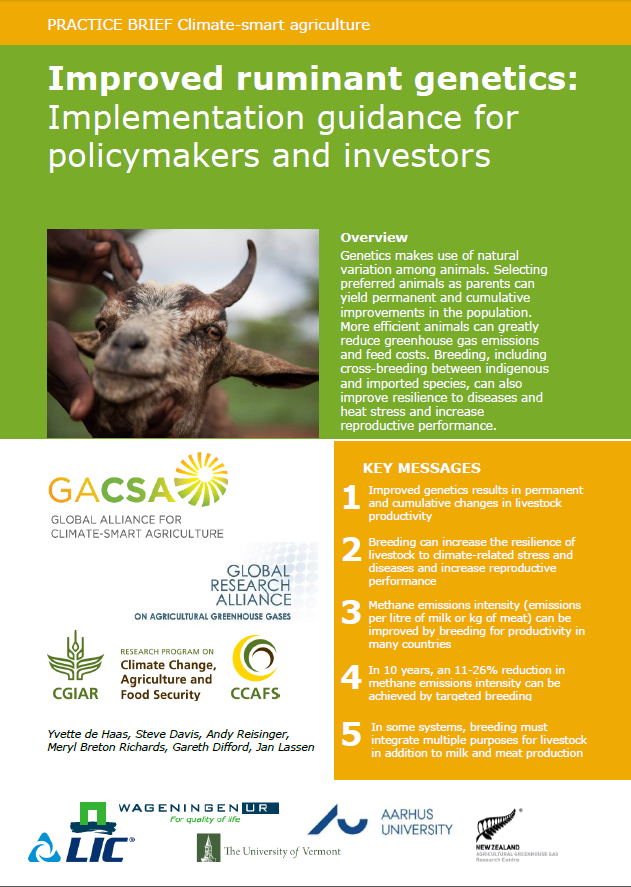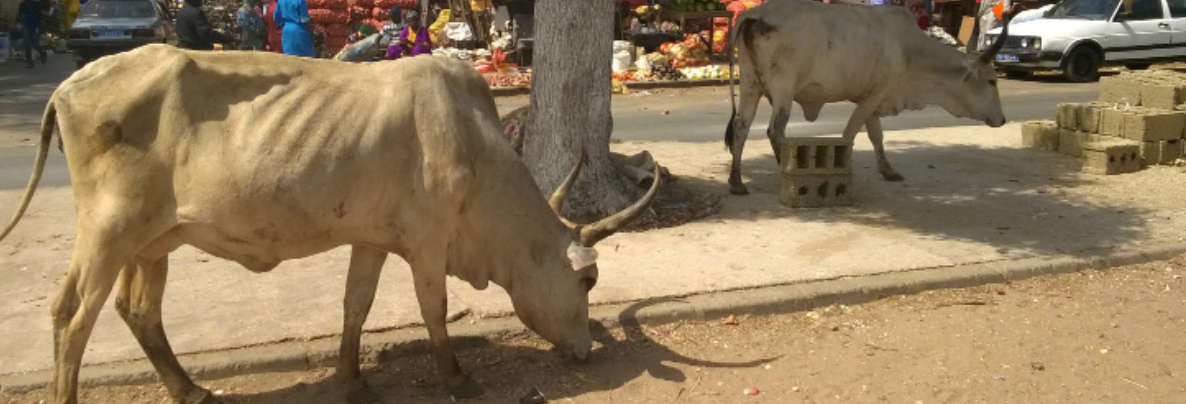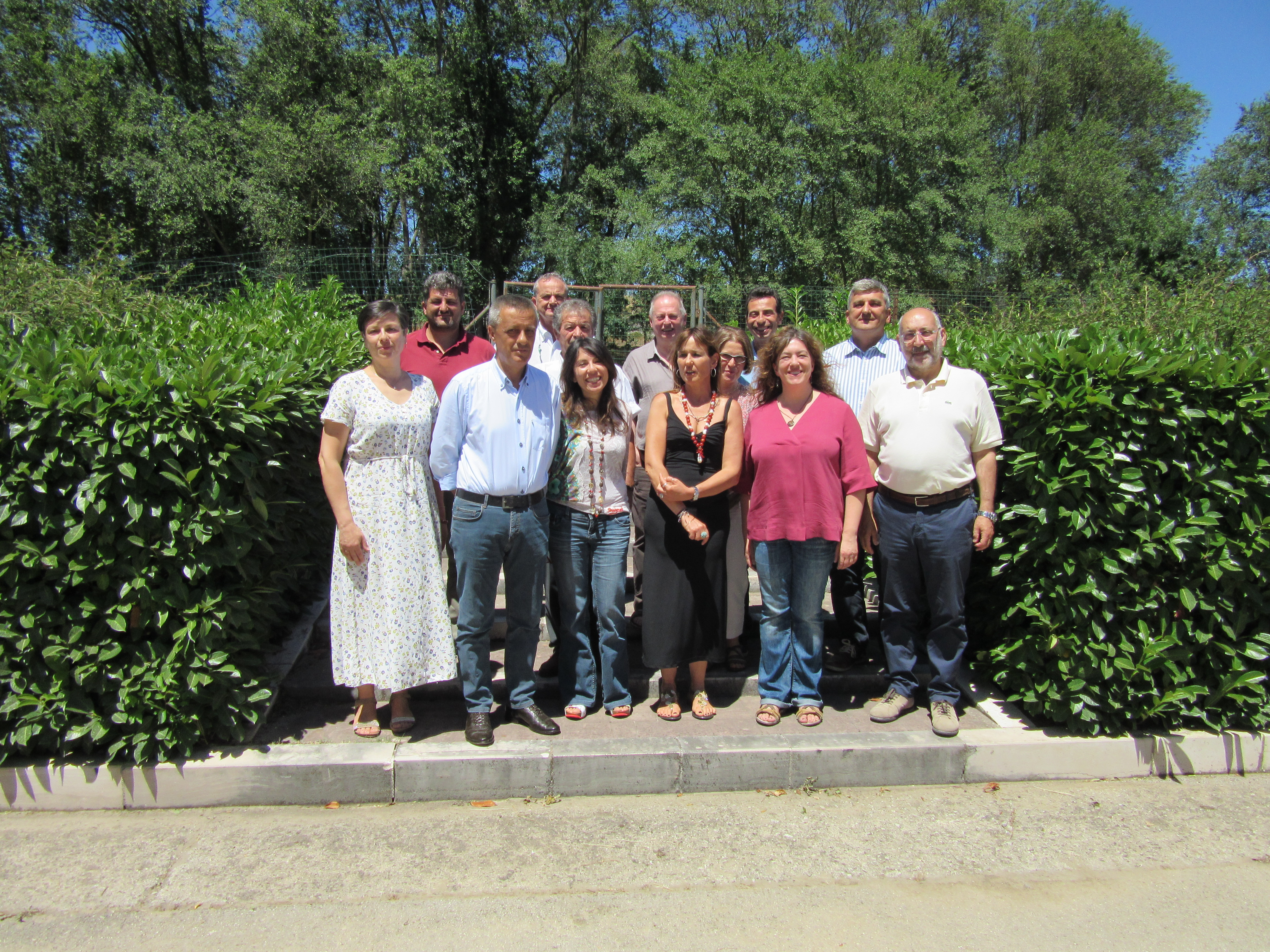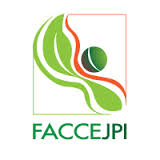The Global Research Alliance on Agricultural Greenhouse Gases is pleased to welcome FONTAGRO (Fondo Regional de Tecnología Agropecuaria / Regional Fund for Agricultural Technology) as a new Partner.
The decision for partnership was decided at the Council meeting held last week (10-13 October 2016) in Mexico City.
FONTAGRO is a unique mechanism of regional cooperation that promotes family farming innovation, competitiveness and food security. Recently FONTAGRO has established a new mission to contribute to innovation in family farming, in order to promote food security in a framework of equity and sustainability. Part of its strategic lines include adaptation and mitigation of climate change as a central theme.
We look forward to working together with FONTAGRO in the research, development and extension of technologies and practices that will help deliver ways to grow more food (and more climate-resilient food systems) without growing greenhouse gas emissions.
Read FONTAGRO’s Partnership announcement
The latest version of the GRA’s Livestock Research Group newsletter is now available.
This edition has articles on:
* Our work with countries in South and South East Asia to support their development of livestock GHG inventories
* New research guidelines from our Feed and Nutrition Network on conducting in vitro experiments
* A preview of the upcoming GRA Council meeting
* Engagement with the IPCC on livestock GHG issues
* Highlights from CCAFS (the CGIAR’s Research Program on Climate Change, Agriculture and Food Security), one of our major partners
Download the newsletter here
Improved ruminant genetics increase animals’ resilience to climate-related stresses, increases reproductive performance, and – in some countries – could achieve emission reductions of 11-26% per unit of product, according to a new practice brief written by scientists from the Global Research Alliance’s Livestock Research Group and the CCAFS low emissions agriculture flagship. This brief is part of the CSA practice brief series of the Global Alliance for Climate Smart Agriculture (GACSA) Knowledge Action Group.
The brief summarises the state of the science in this area and provides implementation guidance for policymakers and investors. It describes how animal breeding can increase livestock productivity and resilience to climate change, while also reducing greenhouse gas emissions intensity. It focuses on opportunities in developing countries, where the majority of the world’s ruminant populations can be found.
More details on the practice brief can be found in a joint LRG/CCAFS blog post here. You can also download the practice brief here.
‘Reducing greenhouse gas emissions from livestock: best practice and emerging options’ was jointly published by the GRA’s Livestock Research Group and the Sustainable Agriculture Initiative (SAI) Platform in late 2014. It is now one of the most downloaded documents on the GRA website.
With thanks to funding support from New Zealand and translation provided by LRG members in France, Chile and Colombia, this popular publication is now available in French and Spanish.
The guide is intended to help farmers and industry leaders make progress on meeting global food demand while reducing the industry’s contribution to climate change. It summarises current best practices ready for implementation at the farm level, as well as emerging options at various stages of research to reduce the greenhouse gas emissions intensity of livestock production across a range of farm systems. It covers intervention options for animal feed and nutrition, genetics and breeding, rumen modification, animal health, manure, and grassland management.
- Download the guidelines in English
- Download the guidelines in French
- Download the guidelines in Spanish
Hard copies of the guidelines in any of the three languages are available from the LRG: [email protected]
Researchers show how improved greenhouse gas inventories for the livestock sector meet international requirements, support climate change and productivity goals and help broaden countries’ policy options.
For media interviews and enquiries please contact:
Andy Reisinger / +64 21 613 125 / [email protected]
Julianna White / +1.802.777.7017 / [email protected]
WELLINGTON, NEW ZEALAND // BURLINGTON, USA (23 August 2016) – Scientists say that using advanced greenhouse gas inventory and accounting methods to monitor, verify and report on emissions will be necessary for livestock to demonstrate that it is contributing effectively to the ambitious goals of the Paris Agreement on climate change.
Scientists from the Livestock Research Group of the Global Research Alliance on Agricultural Greenhouse Gases (GRA) and the CGIAR Research Program on Climate Change, Agriculture and Food Security (CCAFS) argue in a newly released brochure that more accurate and robust information on greenhouse emissions and productivity from livestock, captured through an advanced inventory system, will be essential if the sector is to contribute effectively to climate and development outcomes.
“61 nations included mitigation in the livestock sector in their Intended Nationally Determined Contributions submitted to the United Nations Framework Convention on Climate Change in 2015,” Lini Wollenberg, leader of the CCAFS Low Emissions Development research program based at the University of Vermont’s Gund Institute for Ecological Economics, said. “They need advanced greenhouse gas inventories to report on changes in emissions and the reductions in emissions intensity that result from more productive and efficient livestock systems.”
Simple inventory methods (called Tier 1) use livestock numbers multiplied by a constant emission factor per animal, meaning that the only way to reduce emissions from livestock is to reduce animal numbers – not plausible for countries concerned with food security and rural development. Researchers point out that livestock development and climate change outcomes can support each other: more productive and efficient farm systems generally produce food at much lower greenhouse gas emissions per unit of product.
The brochure draws on a global analysis demonstrating that doubling the milk production of low-yielding dairy systems, from 1,500 to 3,000 litres per cow per year, could roughly halve the greenhouse gas emissions per litre of milk from those systems. However, if a country’s livestock greenhouse gas inventory does not use advanced methods (called Tier 2), then the impact of such productivity gains is missed.
Advanced inventories allow countries to understand the impact of different productivity measures on emissions. For example, reductions in emissions intensity may be achieved through (see e.g. here and here):
- Improved digestibility of feeds
- Increased pregnancy rates for mature breeding cows
- Increased weight gains in finishing animals.
Such productivity measures may support rural economic development, form the basis of a climate change mitigation plan to be submitted to the UNFCCC, or help qualify a country for climate finance.
Uruguay, for example, used its advanced greenhouse gas inventory in the livestock sector to commit to reducing emissions intensity in livestock (i.e. emissions per kg of meat) by 31-46% by 2030 from base year 1990. The inventory also allows Uruguay to incorporate outcomes from productivity improvements into its domestic policies and use them to demonstrate progress towards its INDC.
“Many countries know that a Tier 2 inventory would be incredibly helpful for them, but they are deterred by the perceived complexity and the resources required. An inventory based on Tier 2 methods is by its nature more detailed than the simple Tier 1 methods that most countries start out with, but it does not have to be much more complicated,” explained Harry Clark, Co-chair of the GRA’s Livestock Research Group and Director of the New Zealand Agricultural Greenhouse Gas Research Centre.
“Countries need guidance and support on how to set up an inventory that is credible and defensible but does not place unrealistic demands on their data sources,” Clark said.

“Livestock development and climate change: The benefits of advanced greenhouse gas inventories” was first published by the Global Research Alliance on Agricultural Greenhouse Gases and the CGIAR Research Program on Climate Change, Agriculture and Food Security on 23 August 2016. It is available online at: http://hdl.handle.net/10568/76520
Further reading:
Livestock Research Group of the Global Research Alliance on Agricultural Greenhouse Gases (GRA): www.globalresearchalliance.org/research/livestock
Emissions data, greenhouse gas emissions measurement methods, and tools, for agriculture: www.samples.ccafs.cgiar.org
Low emissions development in agriculture: quantification, decision-making and implementation: https://ccafs.cgiar.org/themes/low-emissions-agriculture
The Global Research Alliance on Agricultural Greenhouse Gases brings countries together to find ways to grow more food without growing greenhouse gas emissions. Its Livestock Research Group (LRG) is focused on reducing the emissions intensity of livestock production systems and increasing the quantity of carbon stored in soils supporting those systems. The LRG works with scientists, farmers and farm advisors, industry and policy makers to research mitigation options, share knowledge and experiences and help strengthen the resilience of livestock farming.
The CGIAR Research Program on Climate Change, Agriculture and Food Security (CCAFS) brings together the world’s best researchers in agricultural science, development research, climate science and Earth System science, to identify and address the most important interactions, synergies and trade-offs between climate change, agriculture and food security. The University of Vermont hosts research focusing on low emissions agriculture. Research is carried out with support from CGIAR Fund Donors and through bilateral funding agreements. For details please visit https://ccafs.cgiar.org/donors.
The New Zealand Agricultural Greenhouse Gas Research Centre (NZAGRC) coordinates research and development into agricultural greenhouse gas mitigation solutions in New Zealand. The NZAGRC’s focus is to provide knowledge, technologies and practices that grow agriculture’s ability to create wealth for New Zealand in a carbon-constrained world. The NZAGRC works in partnership with nine New Zealand organisations to deliver practical on-farm solutions to mitigate methane, nitrous oxide and increase understanding and stability of soil carbon stocks.
Previous studies using models have shown that in theory, improving the health of livestock increases productivity while decreasing relative emissions intensity (EI). A similar study in East Africa has shown the same trend. With the removal of the endemic disease trypanosomiasis, cattle on East African farms increased productivity and decreased EI per unit of protein at between 2 and 4%, depending on the production system. In West Africa, the removal of trypanosomiasis led to decreased EI in some systems but increased EI in others, because when the disease was removed more males were kept and used for draft purposes.
The study was funded by the International Livestock Research Institute under Global Research Alliance Partner CGIAR (CCAFS), and included Animal Health & GHG Emissions Intensity Network Champion, Dr Michael Macleod (SRUC), and Network Coordinator, Dr Timothy Robinson (ILRI).
Read more about the study (page 4)
Read more about the Animal Health & GHG Emissions Intensity Network
On 20th July 2016, the first meeting of the network “Actions for Mitigation of and Adaptation to Climate Change in Livestock Sector in Mediterranean Area”(MLN) was held in Bella, Italy. The meeting was hosted by the Extensive Animal Husbandry Research Unit of the Council for Agricultural Research and Economics (CREA-ZOE). The idea to create MLN arose at the annual LRG meeting held at Lodi (IT) and was launched at the GRA Engagement Workshop, held in Izmir (Turkey) on November 18-19 2015, to deal with three areas representing key concerns for livestock in the Mediterranean region: water, mycotoxins, and good practices of mitigation and adaptation.
Outcomes of the meeting included actions to gather literature on themes of interest and on relevant national and international programs to MLN, and the decision to apply a COST project to MLN activities, with particular attention paid to methods and to novel concerns (i.e. emerging mycotoxins).
All the scientists who expressed their interest in MLN will be invited to join the project and to share this information with other colleagues, especially if belonging to countries not presently involved.
A summary report is available here. All people interested to join MLN can contact the GRA Secretariat or Giacomo Pirlo ([email protected]).
Issue 5 of the UK’s Agri-Science and Innovation Newsletter is now available to download.
The newsletter communicates the UK’s participation in the Global Research Alliance through the UK Government’s investment in the UK Agricultural Greenhouse Gas Research Platform (www.ghgplatform.org.uk), including UK participation at Alliance Research Group meetings, Alliance activities and networks being led by the UK and participation at capacity building workshops and network meetings by UK scientists.
For more information on the UK’s participation in the Global Research Alliance please see their country page at http://globalresearchalliance.org/country/united-kingdom/ 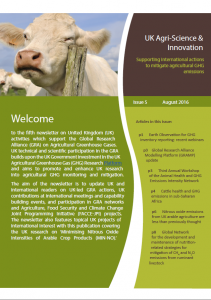
A series of webinars took place earlier this year to share the outcomes of the UK-led project “Scoping the potential for Earth Observation to provide agricultural activity data for inventory compilation”.
For those that couldn’t attend, the webinars were recorded and are now available to view online:
- International Stocktake on Activity Data requirements and Earth Observation for Inventory Compilation
- Historic International Earth Observation Usage Case Study
- Using the annually updated but coarse resolution MODIS global land cover product for greenhouse gas accounting. A case study for the UK.
Handouts for each webinar topic are available for download
If you have any comments or questions please use the contact details provided in the handouts.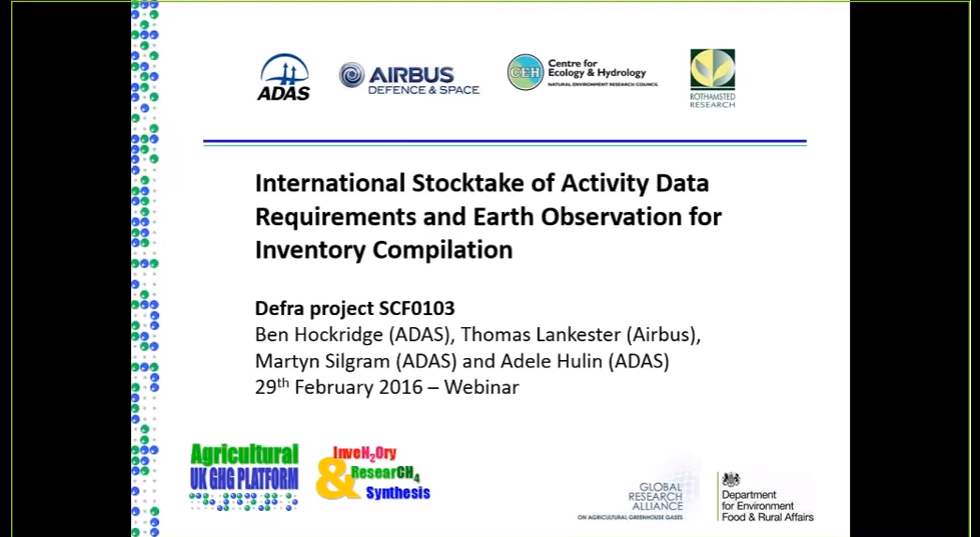
The Paddy Rice Research Group’s Sub-America’s division met on 13-15 July this year in Stuttgart, Arkansas, USA. The meeting was attended by 10 GRA Member countries: Argentina, Brazil, Canada, Chile, Colombia, Indonesia, Japan, New Zealand, Uruguay and USA, and a meeting report will soon be available. The presentations for the meeting are now available in the Members’ Area of the website.
The latest newsletter for the Joint Programming Initiative on Agriculture, Food Security and Climate Change (FACCE-JPI) can be viewed here
Of particular interest to GRA Members who submitted proposals or who participate in both the GRA and FACCE-JPI, in this newsletter the FACCE-JPI notes that the ERA-Gas call for transnational research projects on monitoring & mitigation of GHGs from agri- and silvi-culture generated 28 pre-proposals with 169 partners. Evaluations will be available 14 October 2016.
The FACCE-JPI comprises 22 countries committed to building an integrated European Research Area addressing the interconnected challenges of sustainable agriculture, food security and impacts of climate change. Research is steered to support sustainable agricultural production and economic growth and contribute to a European bio-based economy, while maintaining and restoring ecosystem services under current and future climate change.
Read more about FACCE-JPI here
Our recently formed Integrative Research Group (IRG) now has its own web page: http://globalresearchalliance.org/research/integrative/
The IRG was agreed at the GRA Council meeting in September 2015 as a merger of the previous Soil Carbon Nitrogen Cycling Group and Inventories & Monitoring Groups. The IRG met for the first time at the Livestock Research Group Meeting in February 2016.
Visit the page for IRG information, including leadership, participating countries, and group activities.

